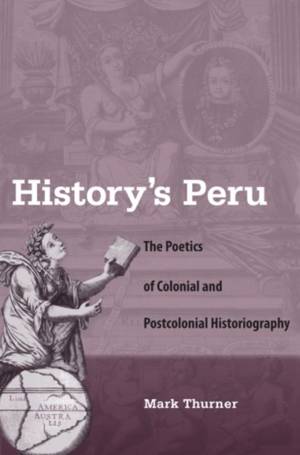
- Retrait gratuit dans votre magasin Club
- 7.000.000 titres dans notre catalogue
- Payer en toute sécurité
- Toujours un magasin près de chez vous
- Retrait gratuit dans votre magasin Club
- 7.000.0000 titres dans notre catalogue
- Payer en toute sécurité
- Toujours un magasin près de chez vous
History's Peru
The Poetics of Colonial and Postcolonial Historiography
Mark ThurnerDescription
More than the story of a South American country, History's Peru examines how the entity called "Peru" gradually came into being, and how the narratives that defined it evolved over time.
Mark Thurner here offers a brilliant account of Peruvian historiography, one that makes a pioneering contribution not only to Latin American studies but also to the history of historical thought at large. He traces the contributions of key historians of Peru, from the colonial period through the present, and teases out the theoretical underpinnings of their approaches. He demonstrates how Peruvian historical thought critiques both European history and Anglophone postcolonial theory. And his deeply informed readings of Peru's most influential historians--from Inca Garcilaso de la Vega to Jorge Basadre--are among the most subtle and powerful available in English.
In this tour de force, Thurner examines the development of Peruvian historical thought from its misty colonial origins in the sixteenth century up to the present day. He demonstrates that the concept of "Peru" is both a strange and enlightening invention of the modern colonial imagination--an invention that lives on today as a postcolonial wager on a democratic political future that can only be imagined in its own historicist terms, not those of European or Western history.
A fascinating counter example to those who mistakenly believe history to be an exact and objective science, History's Peru is an intellectual adventure of wide scope and great originality.
Spécifications
Parties prenantes
- Auteur(s) :
- Editeur:
Contenu
- Nombre de pages :
- 320
- Langue:
- Anglais
Caractéristiques
- EAN:
- 9780813041995
- Date de parution :
- 15-07-12
- Format:
- Livre broché
- Format numérique:
- Trade paperback (VS)
- Dimensions :
- 152 mm x 229 mm
- Poids :
- 430 g

Les avis
Nous publions uniquement les avis qui respectent les conditions requises. Consultez nos conditions pour les avis.






